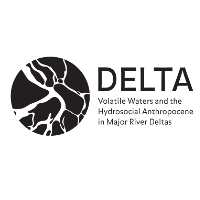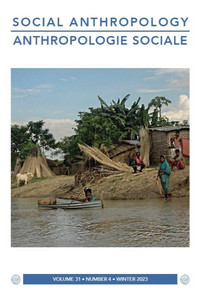This Special Issue proposes volatility as a term with which to approach some of the challenges that shape the current world. The contributions develop this term as an analytical concept and perspective by thinking with people and ecologies from the margins, where uncertainty and rapid transformations have long been the order of the day. An approach focusing on volatility as a social and ecological condition provides an opportunity to consider what life in a radically uncertain world means and does to its inhabitants, which may offer useful lessons to those of us who are currently being forced to let go of their illusionary certainties.
After our 2021 online workshop "Making and unmaking volatility: contextualising crises in deltaic lifeworlds", we developed some contributions into journal articles in collaboration with an outgoing and an incoming editorial team at Social Anthropology / Anthropologie Sociale, the journal of the European Association of Social Anthropologists. Thank you very much, Arne Harms, Ville Laakkonen, Lukas Ley, Dimitra Kofti, Isabelle Rivoal, Laia Soto Bermant, Nikolai Ssorin-Chaikov, all the anonymous reviewers, and everyone else who helped us towards publication! Special thanks are due to Thomas Hylland Eriksen, for co-editing the collection, and Mark Nuttall, for his insightful afterword. And of course to the authors and their research participants who produced innovative and though-provoking articles!
We're especialy happy to be benefiting from the journal's Open Access model, so please feel free to browse through the articles below:
Social Anthropology/Anthropologie Sociale 31 (4): Volatility – Making and Unmaking Liveable Worlds.
Introduction
Franz Krause and Thomas Hylland Eriksen: Inhabiting Volatile Worlds
Articles
Veronica Strang: The Hard Way: Volatility and Stability in the Brisbane River Delta
Before European colonisation, the Brisbane River supported several indigenous language groups who, working with its natural variations in flow, were able to sustain stable hunter-gatherer lifeways for many millennia. In contrast, colonial settlers made strenuous efforts to control one of Australia's largest and most unpredictable rivers, driven by aims to achieve social and material stability in what they saw as a hostile and adversarial environment. Part of the perceived threat was – and still is – the river's ‘volatility’ and its tendency, from time to time, to send great surges of floodwater downstream. Brisbane's contemporary inhabitants have had to consider how to engage with the non-human environment in ways that move beyond hard-line visions of command and control and embrace more convivial ideas about working with the river.
Thomas Hylland Eriksen: Clashing Scales and Accelerated Change: Two Cases from Norway
Sometimes attempts to reduce volatility have the opposite effect. A naturally flexible system which is regimented and disciplined to a fixed shape loses its ability to adjust to shifting circumstances. This is a recurrent theme in the anthropology of globalisation, where the dynamics between the fixed and the fluid are no less important than the more commonplace local–global contrast. Modernity produces infrastructures, institutions and practices that are unable to adapt smoothly to changing ecological conditions, giving priority to standardised models rather than solutions tailored to fit assemblages with unique characteristics. This article discusses two cases from Norway – a controversy over a bridge in an ecologically vulnerable area and a mudslide leading to considerable material damage and the loss of ten lives – as a means of looking into the scalar gaps and the relationship between stability and volatility in a society committed to technological control.
Ian Scoones: Confronting Uncertainties in Pastoral Areas: Transforming Development from Control to Care
Pastoralists must continuously confront uncertainties, responding to high levels of variability and volatility where the future is unknown. Yet mainstream modernising development in pastoral areas aims to create stability through control, enacted through restrictive plans and policies. Through a series of case studies, this article explores pastoralists’ own sensitive, flexible and caring responses, attuned to the instabilities of pastoral settings. The cases show how uncertainties can be seen as intersecting constructions of knowledge, materiality, experience, embodiment and practice, where flexible, often collective, caring approaches are central to pastoralists’ lives. These insights have wider implications for other contexts where people inhabit uncertain worlds, and so suggest a fundamental challenge to the controlling approaches of conventional development.
Kirsten Keller: Mussels and Megaprojects: Landscape Structure and Structural Inequality at Jakarta's Coast
Structural inequality is typically analysed as a human issue. In contrast, this article explores how multispecies approaches can illuminate how structural inequality is (re)produced through more-than-human landscapes. It focuses on Jakarta, Indonesia, where anthropogenic subsidence is pulling the coastline into the sea. Coastal kampung settlements, already marginalised, face increased flooding and displacement by seawall infrastructures. By combining colonial histories of delta infrastructures with ethnographic attention to kampung Maura Turun and the Asian green mussels that its residents cultivate, the article examines how subsidence is produced and how inequalities are made through landscapes of water and waste. Mussels are engaged as a tracing device, an entry point into the overlapping, situated crises entangled with subsidence that kampung dwellers experience. Overall, the article proposes that paying attention to more-than-human relations, in this case with mussels, can illuminate an ecological dimension of structural inequality.
Beth Cullen: Changing Monsoonal Waterworlds: Sensing Delta Volatility through Hilsa Fish
This article explores volatility from the perspective of hilsa fish in the Bengal Delta. The hilsa, known as ilish in Bengali, takes advantage of monsoonal hydrological dynamics in its life cycle. Today, hilsa are changing in response to anthropogenic activities, which attempt to stabilise delta landscapes in response to perceived volatility, but generate new volatilities that are felt and sensed corporeally by people who are entangled with hilsa lifeways. Interactions with a fisher, a cook, a scientist and an environmental activist during multi-sited ethnographic fieldwork in Bangladesh provide insights into how hilsa are experiencing and responding to spatial, material and temporal environmental transformations. Embodied understandings of hilsa lifeworlds gained through acts of fishing, cooking, dissecting and monitoring reveal the more-than-human reverberations of human-induced volatility.
Jenia Mukherjee, Kuntala Lahiri-Dutt, and Raktima Ghosh: Beyond (Un)Stable: Chars as Dynamic Destabilisers of Problematic Binaries
Until recently, river islands have been neglected in island studies and river/water scholarship. We address this research gap by focusing on the ‘fluidscape’ of the Lower Ganga Basin, West Bengal, India. Drawing empirical insights on chars (river islands) of the River Ganga, located upstream and downstream of the Farakka Barrage, we present lives and livelihoods in this ‘ever-shifting landscape’ and demonstrate how the barrage project led to transplantation–obliteration–resurrection of chars in repetitive cycles and activated ambivalence among choruas (communities inhabiting chars). Our fluid tales of everydayness in the volatile river islands show how these ‘muddyscapes of hazards’ become ‘muddyscapes of opportunities’ along ‘situated adaptive practices’ and contingent adjustments pursued by choruas. We establish chars as the most significant metaphor of destabilisation, dislodging widely held ideas about rivers, vulnerability, adaptation, among others. The deployment of ‘volatility’ as the theoretical-conceptual traction allows us to perceive chars beyond vulnerability and instead as viablescapes.
Sandro Simon: Rhythming Volatilities: Gleaning from and Salvaging for Capitalists
‘We have twelve professions’, say the Serer Niominka of the Sine-Saloum Delta, Senegal. This article traces how they have embraced two short-lived opportunities: to glean sea snails from the bycatch of industrial trawlers and to salvage fish for a fish factory. Salvaging for is about relating oneself and one's environment to capitalist value chains and feeding into them, allowing for ‘salvage accumulation’. Gleaning from, I argue, points in the opposite direction. It is about performing the marginality of remainders of capitalist value chains while redescribing their value for one's own profit. As such, gleaning can be a ‘minor tactic’ that allows one to create niches intertwined with capitalist processes and mobilise them to one's own ends. For the Serer Niominka, this article shows, both gleaning and salvaging have represented ways of exploring and valorising capitalist-induced volatilities as opportunities from ‘below’ and integrating them into their rhythmic meshwork of practice.
Franz Krause: Valued Volatility: Inhabiting Uncertain Flux in the Mackenzie Delta, Canada
This article argues that Ehdiitat Gwich'in and Inuvialuit inhabitants of the Mackenzie Delta cultivate flexibility and a refusal of settler habits by actively avoiding stability and predictability. It discusses ethnographic insights into articulations of dependence, work, schooling, alcohol consumption, gambling and hunting, highlighting the virtues Mackenzie Delta inhabitants see in certain forms of volatility. While some volatilities are regarded as problematic, others are cultivated, rebelling against colonial control and enabling continuity in a fundamentally uncertain world. This article proposes re-evaluating ‘volatility’ as a term with ambivalent, but not only negative, connotations. It may become a useful idiom for coming to terms with a social and ecological world, in which control is neither possible nor desirable.
Afterword
Mark Nuttall: Afterword: Volatility in Turbulent and Uncertain Times

